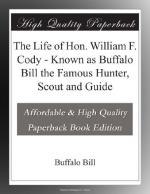Leaving the infantry to guard the supply camp, Colonel Mills struck out for the north with the seven companies of cavalry. One day while we were resting on a prairie near the head of Powder river, a horseman was seen in the distance approaching us. At first it was thought he was an Indian, but as he came near we saw that he was a white man, and finally when he rode up to us, I recognized him as “California Joe,” a noted scout and frontiersman who had spent many years in California, on the plains and in the mountains. He was armed with a heavy old Sharpe’s rifle, a revolver and a knife. I introduced him to Colonel Mills and the other officers and asked him where he was going. He replied that he was out for a morning ride only; but the fact was that he had been out prospecting alone for weeks along the foot of the Big Horn mountains.
Having no permanent occupation just at that time, Joe accompanied us for two or three days, when Colonel Mills suggested that I had better employ him as a scout, so that he could make a little money for himself. Joe didn’t seem to care whether I hired him or not; but I put him on the pay-roll, and while he was with us he drew his five dollars a day. It was worth the money to have him along for company’s sake, for he was a droll character in his way, and afforded us considerable amusement. We finally surprised Little Wolf’s band of Arapahoes and drove them into the agencies. We then scouted the Powder river, Crazy Woman’s Fork, and Clear Fork, and then pushed westward through the mountains to the Wind river. After having been out for a month or two we were ordered to return.
I immediately went East and organized another Dramatic company for the season of 1874-75, Texas Jack being absent in the Yellowstone country hunting with the Earl of Dunraven. I played my company in all the principal cities of the country, doing a good business wherever I went. The summer of 1875 I spent at Rochester with my family.
For the season of 1875-6, Texas Jack and I reorganized our old Combination, and made a very successful tour. While we were playing at Springfield, Massachusetts, April 20th and 21st 1876, a telegram was handed me just as I was going on the stage. I opened it and found it to be from Colonel G.W. Torrence, of Rochester, an intimate friend of the family, who stated that my little boy Kit was dangerously ill with the scarlet fever. This was indeed sad news, for little Kit had always been my greatest pride. I sent for John Burke, our business manager, and showing him the telegram, told him that I would play the first act, and making a proper excuse to the audience, I would then take the nine o’clock train that same evening for Rochester, leaving him to play out my part. This I did, and at ten o’clock the next morning I arrived in Rochester, and was met at the depot by my intimate friend Moses Kerngood who at once drove me to my home. I found my little boy unable to speak but he seemed to recognize me and putting his little arms around my neck he tried to kiss me. We did everything in our power to save him, but it was of no avail. The Lord claimed his own, and that evening at six o’clock my beloved little Kit died in my arms. We laid him away to rest in the beautiful cemetery of Mount Hope amid sorrow and tears.




